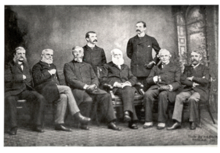
Woodstock is a town in Windham County, Connecticut, United States. The town is part of the Northeastern Connecticut Planning Region. The population was 8,221 at the 2020 census.

James Hammond Trumbull was an American historian, philologist, bibliographer, and politician. A scholar of American Indian languages, he served as the first Connecticut State Librarian in 1854 and as Secretary of State from 1861 to 1866.

Robert Charles Winthrop was an American lawyer, philanthropist, and Whig Party politician who represented Massachusetts in the United States House and Senate from 1840 to 1851. He served as the 18th Speaker of the United States House of Representatives and was a political ally and colleague of Daniel Webster. After a rapid rise in Massachusetts and national politics and one term as speaker, Winthrop succeeded Webster in the Senate. His re-election campaign resulted in a long, sharply contested defeat by Charles Sumner. He ran for Governor of Massachusetts in 1851 but lost due to the state's majority requirement, marking the end of his political career and signaling the decline of the Massachusetts Whig Party.
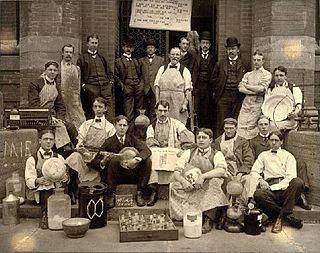
Sheffield Scientific School was founded in 1847 as a school of Yale College in New Haven, Connecticut, for instruction in science and engineering. Originally named the Yale Scientific School, it was renamed in 1861 in honor of Joseph E. Sheffield, a railroad executive. The school was incorporated in 1871. The Sheffield Scientific School helped establish the model for the transition of U.S. higher education from a classical model to one which incorporated both the sciences and the liberal arts. Following World War I, however, its curriculum gradually became completely integrated with Yale College. "The Sheff" ceased to function as a separate entity in 1956.

Charles McLean Andrews was an American historian, an authority on American colonial history. He wrote 102 major scholarly articles and books, as well as over 360 book reviews, newspaper articles, and short items. He is especially known as a leader of the "Imperial school" of historians who studied, and generally admired, the efficiency of the British Empire in the 18th century. Kross argues:

Thomas Lindall Winthrop was a Massachusetts politician who served as the 13th lieutenant governor of Massachusetts from 1826 to 1833. He was elected both a Fellow of the American Academy of Arts and Sciences in 1813 and a member of the American Antiquarian Society in 1837.

Jabez Bowen, Sr. was an American shipper, slave trader and politician. He was a militia colonel during the American Revolutionary War, and served as Deputy Governor of Rhode Island and chief justice of the Rhode Island Supreme Court.

Roseland Cottage, also known as Henry C. Bowen House or as Bowen Cottage, is a historic house located on Route 169 in Woodstock, Connecticut, United States. The house was added to the National Register of Historic Places in 1977, and was declared a National Historic Landmark in 1992. It is described as one of the best-preserved and best-documented Gothic summer houses in the nation, with virtually intact interior decorations.
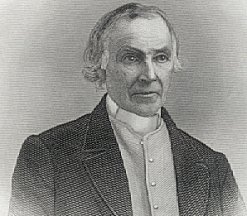
John Denison Baldwin was an American politician, Congregationalist minister, newspaper editor, and popular anthropological writer. He was a member of the Connecticut State House of Representatives and later a member of the U.S. House of Representatives from Massachusetts.
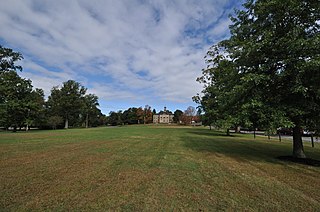
The Woodstock Hill Historic District is a historic district encompassing the historic village center of Woodstock, Connecticut. It is centered on the Woodstock Green, extending south from there toward the junction of Connecticut Route 169 and Plaine Hill Road. Major buildings in the district include the 1821 Congregational Church, the buildings of Woodstock Academy, and Roseland Cottage, a National Historic Landmark that is one of the nation's finest Gothic Revival summer houses. The district was listed on the National Register of Historic Places in 1999.

The Matthew Bowen Homestead, also once known as the Plaine Hill Farm, is a historic house at 94 Plaine Hill Road in Woodstock, Connecticut. It is now the Inn at Woodstock. Built in 1816, it is a prominent and well-preserved example of a Federal period farmstead, with a long history of association with the locally prominent Bowen family. The property was listed on the National Register of Historic Places in 1987.

Jesse Witherspoon Gage was an American football player and coach. He served as the head football coach Massachusetts Agricultural College—now the University of Massachusetts Amherst—in 1909. He compiled a 1–6–2 record that season.

Joseph Collins Wells (1814–1860) was an English-born architect who practiced in New York City from 1839 to 1860. He was a founding member of the American Institute of Architects, and several of his works have been listed on the National Register of Historic Places. Two of his works, the Henry C. Bowen House and the Jonathan Sturges House, have been designated as U.S. National Historic Landmarks. He also designed First Presbyterian Church, a New York City Landmark in Greenwich Village.

Benjamin Swan was an American merchant, banker and politician. He was an important political figure in Vermont and served as State Treasurer.

John Eliot Bowen was an American writer.

Henry Chandler Bowen was an American businessman, philanthropist, and publisher. He was an influential member of Plymouth Church in Brooklyn, where he resided much of his life and the founder of the New York-based newspaper The Independent. He built a Gothic-style summer home at his birthplace Connecticut named Roseland Cottage in Woodstock,

Thomas Buchanan Winthrop was an American philanthropist and lawyer who was prominent in New York society during the Gilded Age.

Alexander Warner was an American Union Army officer, banker, planter, and Republican politician. He was the 15th Secretary of State of Mississippi, the 44th State Treasurer of Connecticut, and a member of the Kansas House of Representatives.
Josiah Dwight was the minister of the West Parish Church of Dedham, Massachusetts, today Westwood's First Parish, from June 4, 1735, until November 1742.
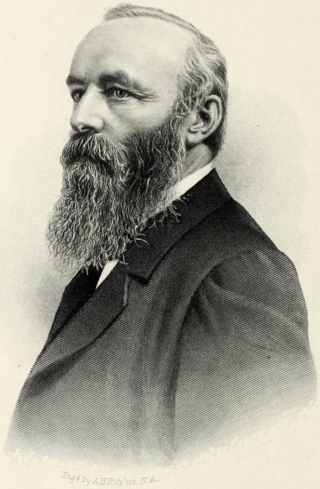
Oliver Henry Perry was an American politician from Connecticut. He served as Secretary of the State of Connecticut in 1854 and as a member of the Connecticut House of Representatives in 1847–1849, 1853, 1857, 1859–1860 and 1864.



